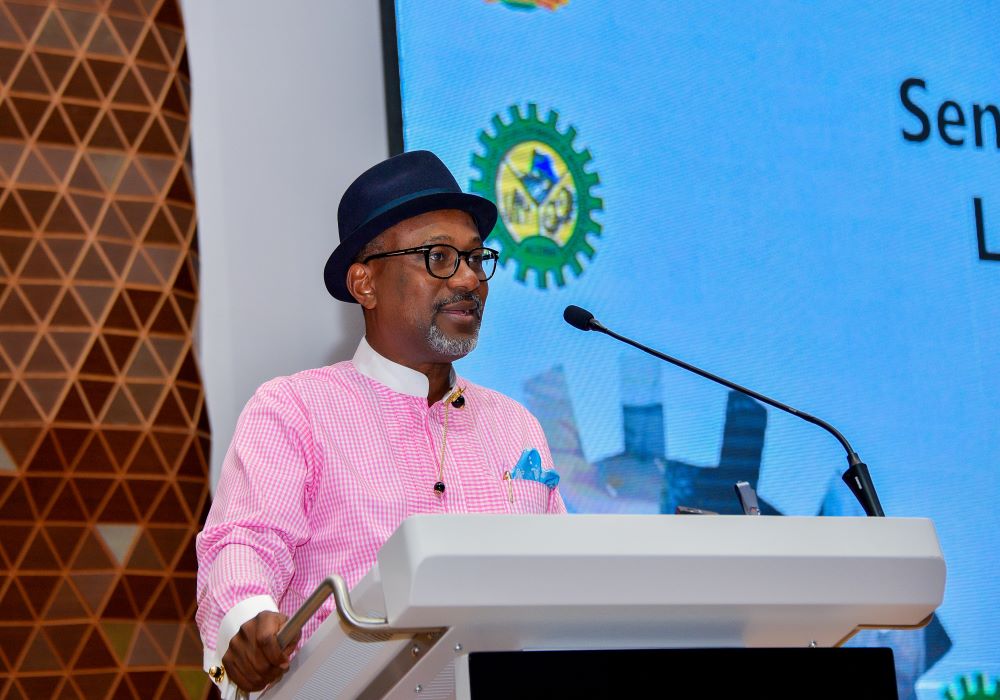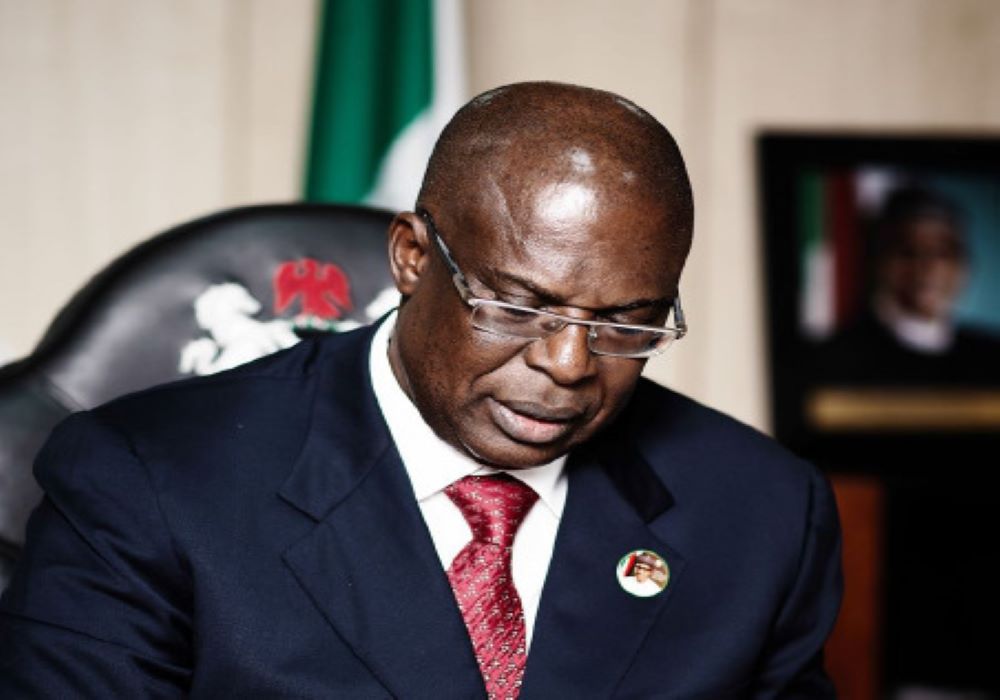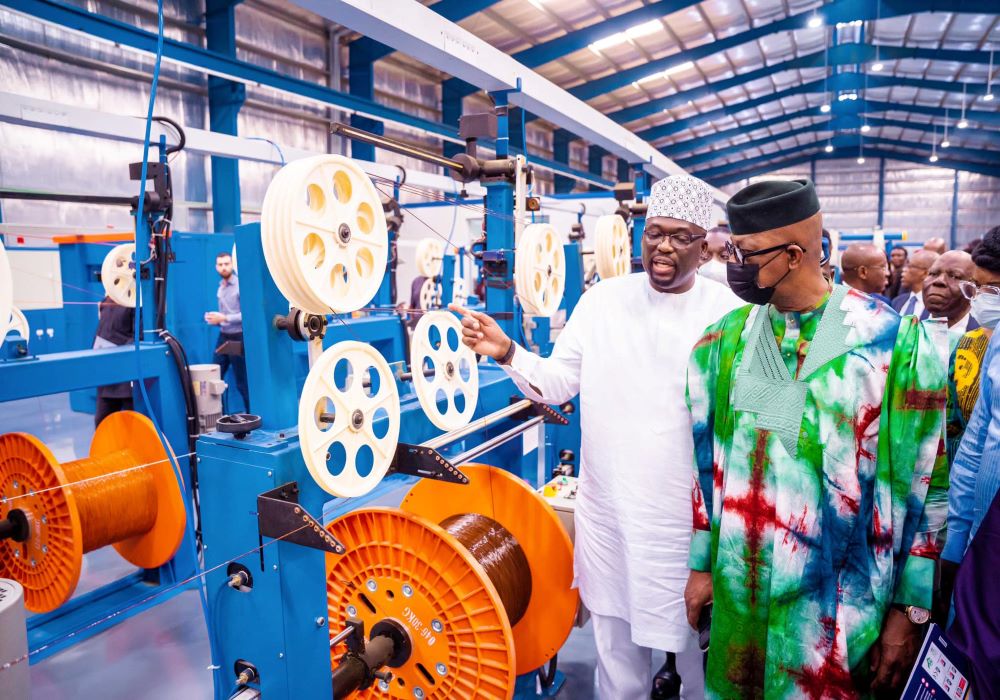Energy
Quality Petroleum Education will solve challenges of Energy Transition, create boom in Gas Sector- Wabote
Lucky MOMOH
WARRI-THERE is an urgent need for the Federal Government and other stakeholders of the oil and gas industry to intensify efforts in the promotion of quality petroleum education and development of competent manpower who would help Nigeria meet the challenges of the ongoing energy transition and expected boom in the gas sector.
This was the key recommendation by the Executive Secretary of the Nigerian Content Development and Monitoring Board (NCDMB), Engr. Simbi Kesiye Wabote in the convocation lecture he delivered on Friday at the Federal University of Petroleum Resources (FUPRE) Effurun, Delta State, titled “Defining the Value of Local Content in Petroleum Education.”
He canvassed that as western nations shift their attention from oil and gas and focus on the provision of funding, manufacturing of equipment, and development of supply chain to support their renewable energy sources, it is imperative that Nigeria and other hydrocarbon-rich countries develop the requisite capacity and capability to produce and utilize their fossil fuel resources.
According to him, the ongoing debate and the deadlines being set in respect of energy transition underscored the need to develop home-grown skill sets to develop and manage the nation’s natural resources. He stressed that “the narrative around energy transition has further revealed the need to ensure that there is a direct link between our petroleum education and the development and utilization of our hydrocarbon resources, so we are able to deal with any outcome of the transition.”
Commenting on the recent enactment of the Petroleum Industry Act 2021 and the Decade of Gas initiative, Wabote pointed out that those developments would not only engender investments and utilization of the nation’s estimated 600 trillion cubic feet of gas reserves but also lead to a boom in the gas sector, which would benefit discerning institutions, investors, operators, and service providers.
He added that “these scenarios require a robust petroleum education sector to ensure that our in-country skill sets are available and sufficient to support the exploration, development, production, and processing of hydrocarbon resources.”
The Executive Secretary charged educational institutions in Nigeria to prepare for the opportunities and challenges of energy transition and gas revolution by preparing robust curriculum in petroleum education with the mindset of enabling Nigerians develop and utilize our hydrocarbon resources using our home-grown technology. The institutions should put require greater focus on development of top-notch graduates to enable the development of Nigerian hydrocarbon resources – especially gas, he canvassed.
This he further explained, “will ensure that we are not forced out from the development of hydrocarbon resources due to lack of technical capability as was the case with coal development in Enugu.”
He maintained that FUPRE is an institution devoted to petroleum education and should be at the forefront of preparing our manpower needs for any outcome or impact of Energy Transition.
He agreed on the need to add renewables to the global energy mix to ensure energy security, but criticized attempts by the western world to demonize or de-marketing other energy sources as well as extracting commitments and setting unrealistic deadlines for countries to abandon fossil fuels.
He advised all nations to jealously guard their locally available sources of energy and ensure they remain in their energy mix for the benefit of their people.
He also highlighted two implications that have emerged from the rush to move the world away from fossil fuels and they include Divestment, whereby western countries shift funding away from the development of hydrocarbons towards renewable energy and Energy Shortage, which is the decline in the supply of hydrocarbons due to lack of investments and the fast pace of the shift to renewable energies.
He posited that Divestment has resulted in the emergence of indigenous companies playing major roles in exploration and production activities “such that companies like AITEO, FIRST E&P, EROTON, and others have acquired assets and are now responsible for producing about 15% of Nigeria’s oil and more than 60% of domestic gas.”
He however regretted that the divestment of the international oil companies and their reluctance to make further investments in oil and gas have resulted in the repatriation of capital out of Nigeria. “This stifles the nation’s economy of the much-needed foreign exchange with funds used as loans to acquire oil and gas assets instead of being used to develop new production assets,” he rued.
Energy
NLNG Improves Nigeria’s Domestic LPG Supply Operational Efficiency

In line with its continuous improvement culture, the Nigeria LNG Limited (NLNG) will be working closely with its stakeholders to improve operational efficiency in its domestic Liquefied Petroleum Gas (DLPG) supply in Nigeria.
According to a statement from its General Manager, External Relations and Sustainable Development, Sophia Horsfall, this was highlighted at an engagement session with stakeholders in Lagos.
It was gathered that the NLNG plans to enhance engagement and improve operational efficiency of its LPG supply through digitalisation of some of its processes which include a new platform designed to streamline regulatory processes, optimise risk management, and enhance the buyer experience. The platform will feature IT-supported relationship management, automated issue resolution, centralised real-time payments, and improved case management systems, ensuring a seamless supply process despite market shifts and external pressures.
ALSO READ: Ifon-Ilobu Crisis: Adeleke Assures Of Quick Restoration Of Peace
Manager, Commercial Contract Management, NLNG, Tolulope Longe, reiterated that the planned improvements will enable and consolidate NLNG’s resolve to delivering 100% of its LPG supply to the Nigerian market.
She said a strategic roadmap was in play to ensure the achievement of NLNG’s longstanding goals of LPG being accessible and available in the country, aligning with its vision of being a globally competitive energy company, improving lives sustainably. She also harped on the significance of these improvement initiatives and the Company’s push for LPG utilisation as a clean energy source alternative to kerosene and other fossil fuels
Longe noted that the Company remained focused on growth and sustainability of the LPG market by continuously enhancing its supply processes in collaboration with offtakers. She stressed NLNG’s commitment to collaborating with stakeholders to maintain pricing stability and long-term market viability. While acknowledging industry concerns, she noted the importance of operational efficiency in meeting market demands.
NLNG aims to strengthen stakeholder engagement and improve market efficiency in the LPG sector through enhanced customer interactions, minimised schedule disruptions, timely confirmations and deliveries, and prioritisation of customers with demonstrable capacity. As it adapts to market realities, NLNG remains committed to driving sustainability and delivering lasting value to Nigerians.
Energy
Savannah Energy Completes SIPEC Acquisition

In line with its announcement of 19 March 2024, Savannah Energy has completed the acquisition of Sinopec International Petroleum Exploration and Production Company Nigeria Limited (SIPEC).
Making the revelation, an elated Chief Executive Officer, Savannah Energy, Andrew Knott, said, “We are delighted to announce the completion of the SIPEC Acquisition – the achievement of one of our core business priorities for 2025. Our focus at the Stubb Creek Field will now turn to progressing the expansion project, which we expect to increase production by almost three quarters over the course of 2025/26. I look forward to updating shareholders on this in the coming months, as well as on the progress we make towards achieving the other core business priorities we outlined to shareholders earlier this month.”
He expressed gratitude to the Nigerian government for making the acquisition possible, having required several levels of regulatory approvals.
ALSO READ: Tinubu Plans 10,000 Electric Vehicles For North-East
“I would like to thank the Government of Nigeria for the support that they have shown our Company in approving the SIPEC Acquisition and I extend a warm welcome to the SIPEC employees joining Savannah today,” he added.
Biztellers reports that the SIPEC’s principal asset is the 49% non-operated interest in the Stubb Creek oil & gas field (“Stubb Creek Field”), which is operated and 51% owned by Universal Energy Resources Limited (a Savannah affiliate company).
The SIPEC Acquisition increases Savannah’s Reserves and Resources base by approximately 30% from 151 MMboe to 197 MMboe. It adds 227 Bscf of 2C gross gas Resources at Stubb Creek Field, securing significant additional long-term feedstock gas available for sale to Accugas customers.
It was gathered that the transaction consideration was fully funded through a drawdown under a US$60 million Reserve-Based Lending debt facility arranged by The Standard Bank of South Africa Limited. At completion the cumulative consideration paid was approximately US$35.1 million (inclusive of approximately US$19.5 million of cash available to SIPEC), with US$2 million in deferred cash consideration payable in eight quarterly installments post-completion.
Savannah now intends to commence an up to 18-month expansion programme, which is anticipated to increase Stubb Creek Field gross production from an average of 2.7 Kbopd in 2024 to approximately 4.7 Kbopd.
Stubb Creek Field, located in Akwa Ibom State, Nigeria, is a producing oil field with considerable undeveloped, non-associated 2C gas resources. As at year-end 2024, Stubb Creek Field had an estimated 11 MMstb of 2P gross oil Reserves and 515 Bscf of 2C gross gas Resources1.
Commercial oil production started at Stubb Creek Field in 2015, with cumulative production of 8.1 MMstb to 31 December 2024. Oil produced at Stubb Creek Field is processed through production facilities onsite and then exported to the Qua Iboe terminal via a 25 km pipeline.
The Stubb Creek Field was converted to a 20-year petroleum mining lease in accordance with the Petroleum Industry Act 2021 and effective from 1 December 2023.
Energy
Shell On Place Of Infrastructure In Developing Nigeria’s Gas resources
Shell has called for the development of infrastructure to promote the growth of domestic gas and monetisation of the resource.
At a panel session at the just concluded Nigeria International Energy Summit (NIES) in Abuja, Managing Director Shell Nigeria Gas (SNG) Ralph Gbobo, said, “The infrastructure will support the delivery of gas from producers to consumers in an efficient way that is also transparent and cost effective.”
Ralph described infrastructure as the bedrock of a thriving gas industry, citing the Escravos – Lagos Pipeline System (ELPS) which feeds the domestic gas market as an example. He said: “If we can fully implement our regulations, a key one being the Network Code and maintain a stable Network where investors can get their returns, I can guarantee that we will see more players come into this space.”
ALSO READ: Shell Exhibition Delivers Value At Energy Summit
SNG which was established in 1988 has led the way in the provision of gas infrastructure in Nigeria, building gas distribution systems in Rivers, Abia and Ogun states through which it delivers gas to over 140 domestic, industrial and commercial customers. Last year, the company signed an agreement with the Oyo State Government to build a gas distribution infrastructure with the intention of delivering gas to businesses in the state and beyond.
Ralph explained: “Our experience at SNG shows that the task of expanding the Nigerian domestic gas market is a collective responsibility and not to be done by just a few players. It requires inputs from the regulatory, upstream, midstream and downstream sectors. The key to unlocking all these inputs is driving and implementing the right polices. The implementation of clear policies and incentives, allows for more investors to come into the domestic gas market be it in terms of gas production or infrastructural development. Investors need to be assured of a stable regulatory and fiscal market where their investments are guaranteed.”
He added: “Shell Companies in Nigeria have invested across the entire value chain of gas — Upstream, Midstream and Downstream having understood the potential of the commodity to accelerate industrial and economic growth in Nigeria.”















